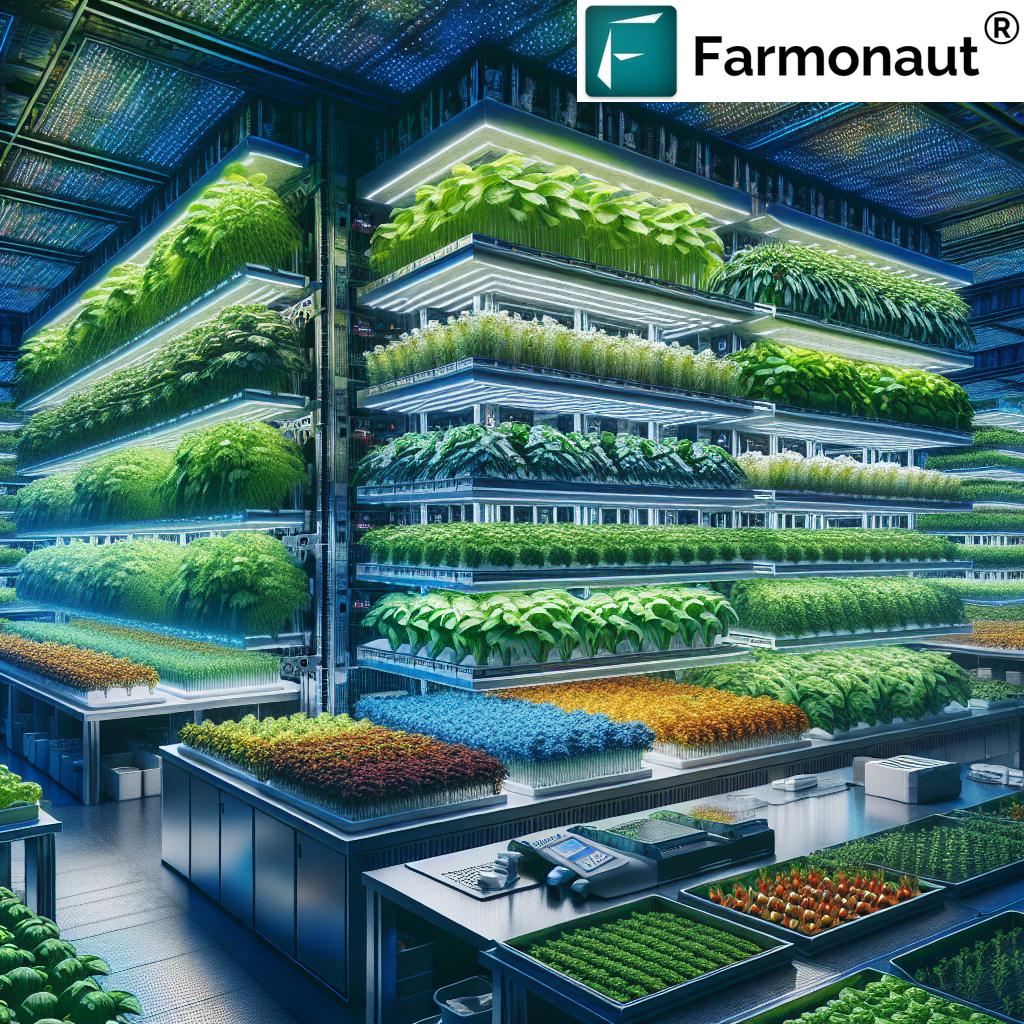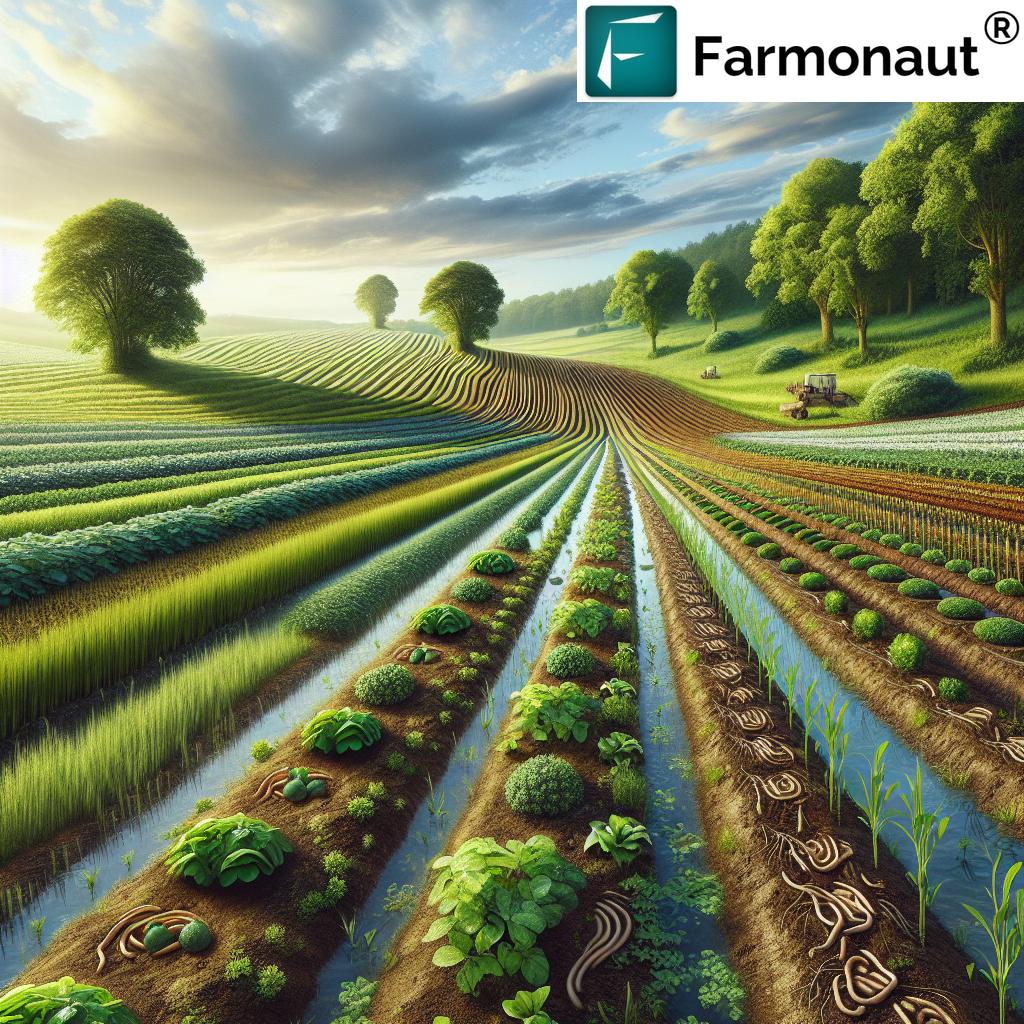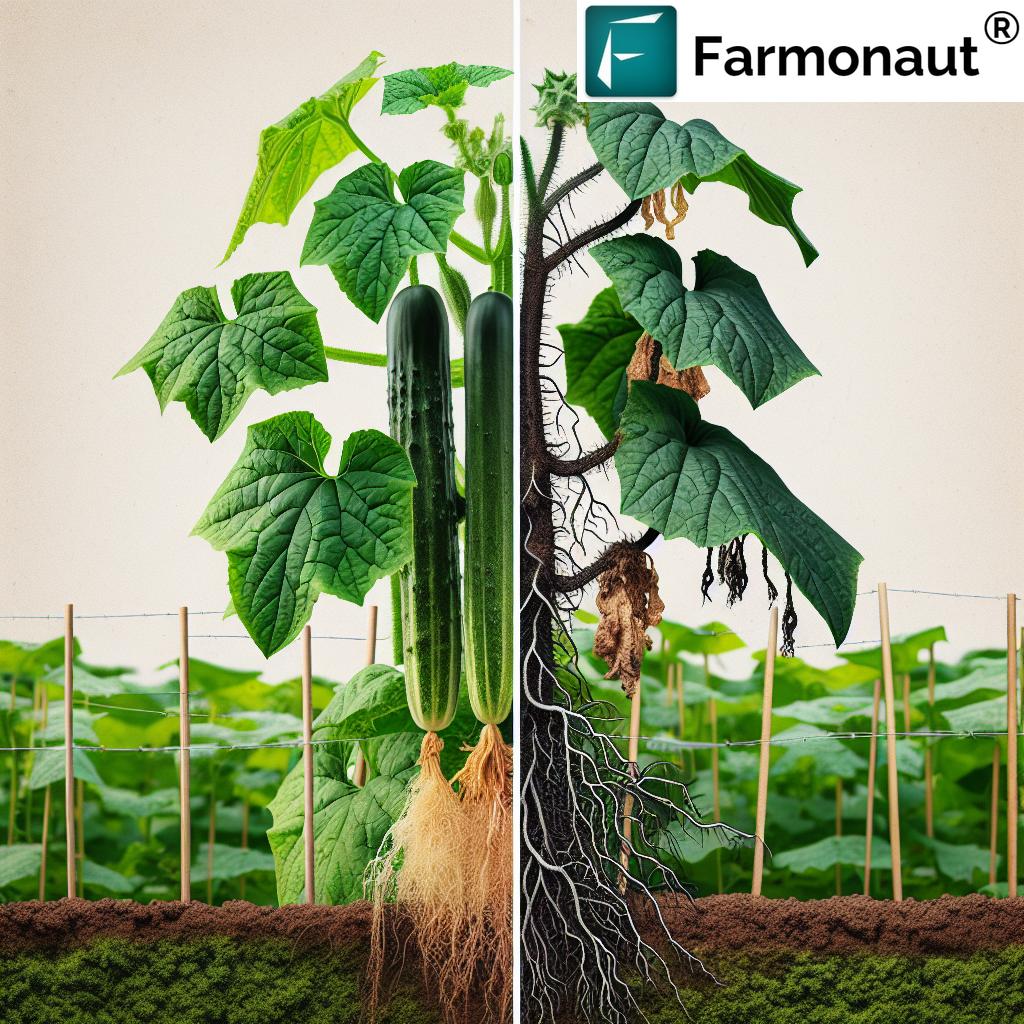Agribusiness Trends: 2025 Breakthroughs You Must See
“By 2025, over 60% of agribusinesses are expected to adopt advanced data analytics for decision-making.”
Table of Contents
- Introduction
- Technological Advancements in Agriculture
- Sustainable and Regenerative Agricultural Practices
- Vertical and Controlled Environment Agriculture
- Data Analytics in Agribusiness: Trends 2025
- Climate-Resilient Agriculture: Adapting for the Future
- Global Trade Dynamics and Market Shifts
- Labor Market Dynamics: Skills & Workforce Innovation
- Financial Technology (Fintech) Integration
- Investment in Alternative Proteins and Food Technologies
- Policy Support and Regulatory Frameworks
- How Farmonaut Empowers the Agribusiness Sector
- Trend Impact Comparison Table
- Frequently Asked Questions
- Conclusion
Introduction: Agribusiness Trends 2025—Shaping the Future of Food, Farming, and Forestry
The agribusiness sector is experiencing unprecedented, technology-driven transformations. From agricultural technology advancements to the rise of sustainable agriculture practices and powerful data analytics in agribusiness, 2025 promises breakthroughs that are set to redefine the way we produce food, manage land, and interact with global markets.
By encompassing agriculture, farming, and forestry, modern agribusiness finds itself at the crossroads of technological innovation, resource management, climate change adaptation, and evolving consumer demand. This momentum is shaping industry standards, boosting productivity, and enhancing resilience in the face of global challenges.
Why does this matter?
Because whether we are growers, business leaders, policymakers, or tech innovators, these agribusiness trends directly impact food security, resource efficiency, sustainability, and the future of rural livelihoods. In this blog, let’s explore these powerful shifts—anchored by tech and sustainability—and examine how providers like Farmonaut make advanced solutions accessible for all.
Technological Advancements in Agriculture: Powering Precision and Growth
At the core of agribusiness trends 2025 is a dynamic shift toward advanced technologies and tools. These innovations are designed to boost efficiency, support informed decisions, and meet the growing global demand for sustainable, high-quality food.
Precision Farming Solutions, Smart Technologies & Digital Tools
Modern farmers are adopting precision farming solutions at scale—deploying drones, sensor networks, GPS-guided tractors, and satellite-based monitoring systems. This level of integration allows us to:
- Optimize resource allocation (water, fertilizer, pesticides)
- Reduce operational waste and environmental impact
- Enable real-time data analytics in agribusiness for irrigation, fertilization, and pest control
- Increase crop yields and operational efficiency
The direct benefits include higher profits, better soil health, fewer chemicals in the food chain, and a measurable boost in resilience.
Relevant Farmonaut Solution: Farmonaut leverages satellite imagery to provide accurate, real-time crop health monitoring and advisory, enabling actionable decisions without expensive hardware investments.
Artificial Intelligence (AI) and Machine Learning: Predict, Analyze, Optimize
Artificial intelligence and machine learning are some of the most transformative technological advancements in agribusiness for 2025. These systems help us:
- Predict weather patterns and climate events before they become critical
- Analyze soil composition and health for optimized crop planning
- Automate everyday processes (irrigation, fertilization, pest management)
- Assist in reducing costs, increasing productivity, and enabling proactive interventions
Farmonaut’s Jeevn AI advisory system provides real-time, AI-based insights for individual farmers and agribusinesses—delivering customized weather forecasts, crop recommendations, and sustainable management strategies.
Blockchain for Supply Chain Transparency & Authenticity
Digital blockchain technologies empower us to guarantee traceability and transparency across the agri-food supply chain. This innovation is crucial for:
- Combating food fraud and ensuring product authenticity
- Responding to consumer concerns about food origin, methods, and organic status
- Establishing trusted records for every transaction or transformation—a vital tool for quality assurance
Farmonaut’s blockchain-based traceability solution enables agribusinesses and corporates to build end-to-end supply chain trust—from farm to fork or fashion industry, instilling confidence in today’s conscious consumers.
Sustainable and Regenerative Agricultural Practices: Towards a Greener Future
Sustainability is no longer optional in agribusiness—it is a core trend shaping 2025. The global industry is rapidly advancing from traditional models to sustainable and regenerative agriculture practices, focused on increasing crop yields and restoring ecological balance.
Regenerative Agriculture: Soil, Carbon & Biodiversity
Regenerative methods center on soil health, carbon sequestration, and the restoration of biodiversity. Common practices include:
- Crop rotation and cover cropping to rebuild soil fertility and reduce erosion
- Reduced tillage to protect soil structure and carbon
- Integrated pest and nutrient management for resilient, healthy crops
By 2025, integrating carbon footprinting and tracking tools—like Farmonaut’s real-time carbon monitoring—is vital for sustainability reporting, policy compliance, and market positioning.
“Sustainable agriculture practices could increase global crop yields by up to 20% by 2025, thanks to new technologies.”
Biological Solutions: Biopesticides, Biofertilizers & Organic Alternatives
There is an accelerating shift towards biological and natural alternatives to synthetic farm inputs, such as:
- Biopesticides for targeted, eco-friendly pest management
- Biofertilizers to boost soil microbiomes and reduce chemical runoff
- Organic inputs that align with consumer demand for clean, sustainably-grown food
These solutions, coupled with digital monitoring of soil and crop health by platforms like Farmonaut, are empowering farmers to adopt practices that satisfy both regulatory and market requirements.
Circular Economy Models: Waste-to-Resource Innovation
Modern agribusinesses now prioritize:
- Turning crop residues into biogas or organic fertilizers for zero-waste agriculture
- Resource efficiency through closed-loop systems
- Developing circular models that recycle byproducts within the farm ecosystem
Farmonaut’s Fleet and Resource Management helps monitor resource flows, optimize logistical operations, and reduce inefficiencies—an essential pillar in future-ready, sustainable agribusiness.
Vertical Farming Innovations & Controlled Environment Agriculture (CEA)
Rising urbanization and the need to conserve arable land have fueled innovations like vertical farming and controlled environment agriculture (CEA). These agribusiness trends for 2025 focus on maximizing productivity, minimizing footprint, and transforming food security in both cities and rural areas.
Vertical Farming Innovations
Vertical farming innovations bring agriculture indoors, utilizing stacked layers in climate-controlled facilities. The key advantages include:
- Year-round production independent of weather patterns
- Optimized use of space, water, and energy
- Reduced pesticide requirements and consistent food quality
By 2025, more startups and established agribusinesses will invest in this sector, unlocking new ways to grow food closer to consumers and cut cross-border shipping emissions.
Controlled Environment Agriculture: Hydroponics, Aeroponics & Beyond
CEA involves advanced growing techniques like hydroponics and aeroponics, where crops thrive with no soil—in nutrient-rich mist or water. These systems allow:
- Precision control of light, temperature, CO2, and humidity for ideal growth
- Up to 90% less water use and higher crop density per square foot
- Year-round yields and protection from pests and diseases
Farmonaut’s remote sensing and monitoring tools can support CEA operators in maximizing efficiency and resource management at scale.
Data Analytics in Agribusiness: Trends 2025
One of the defining agribusiness trends for 2025 is the migration toward data-driven decisions, powered by the convergence of big data and cloud-based analytics tools. This approach streamlines the entire agricultural supply chain—from planning and production to distribution and market analysis.
Big Data, Analytics & Informed Decisions
The integration of data analytics reshapes agribusiness by:
- Providing deep insights into crop performance and field variability
- Predicting consumer preferences and market trends
- Enhancing supply chain optimization and demand forecasting
- Enabling transparent, evidence-based reporting for compliance and sustainability goals
Farmonaut’s APIs for satellite and weather data and developer documentation empower agribusinesses to integrate vital field data into their own decision-support systems—accelerating digital transformation.
Climate-Resilient Agriculture: Adapting for the Future
With climate change disrupting weather patterns, water availability, and disease cycles, climate-resilient agriculture stands out as a must-watch trend for 2025. This movement is transforming how we manage risks and ensure ongoing productivity.
Adaptation Strategies: Drought-Tolerant Crops, Water-Saving Tools & Early Warning Systems
Prominent climate-resilient approaches include:
- Developing and adopting drought-resistant crops suited for shifting rain patterns
- Using smart irrigation and water-use optimization tools
- Deploying predictive models and early-warning systems for extreme weather
Farmonaut assists in monitoring soil moisture, optimizing irrigation, and generating actionable alerts—helping farmers and agribusinesses adapt quickly, build resilience, and minimize losses.
Global Trade Dynamics and Market Shifts
The modern agribusiness sector is shaped by international trade flows, market demand, and a spectrum of policy, economic, and climate-related uncertainties. Navigating these dynamics is a critical success factor.
Trade Policies and Market Access
Trade disputes (e.g., ongoing US-China issues) and changing regulations can ripple through agricultural markets, influencing export volumes, pricing, and farm incomes. For example, U.S. soybean exports alone may drop by 20% without new trade deals, directly affecting rural prosperity and global supply chains.
The solution? Data-driven planning, access to diversified markets, and rapid adaptation to policy changes—all facilitated by digital tools like Farmonaut’s market intelligence modules.
Investment Trends: AgTech Boom
The AgTech market is experiencing a surge—projected to grow from $24.19 billion in 2023 to $54.17 billion by 2029. This robust investment climate accelerates innovations, fosters new business models, and increases competition, ultimately delivering better services for farmers and consumers.
Labor Market Dynamics: Skills & Workforce Innovation
Demographic change and technological advancements are reshaping the rural labor market. In 2025, we’re seeing the rise of new job profiles, changing skills requirements, and novel approaches to labor shortages.
Talent & Skill Requirements for the Digital Farm
Today’s agriculture calls for knowledge in:
- Sustainable and regenerative farming methods
- Carbon management and environmental stewardship
- Precision farming, data science, and technology integration
Roles such as sustainability managers, AI and data analysts, and regenerative agriculture experts are in high demand. Training and upskilling are essential for rural youth and existing workers.
Labor Shortages and Workforce Management
Many countries face labor shortages due to aging populations and urban migration. Key strategies to address this include:
- Mechanization, automation, and the use of robotics
- Temporary work visa programs to bridge temporary needs
- Smart workforce and fleet management platforms, such as Farmonaut’s Fleet Management, which enhances operational efficiency and safety
Financial Technology (Fintech) Integration in Agriculture
Integrating financial technology (fintech) in agribusiness is changing how capital, insurance, and risk management tools reach the farm gate. Agri-fintech solutions play a major role in addressing resource management and empowering the next generation of food producers.
- Access to credit and crop loans, enabled by digital verification and satellite monitoring (as offered by Farmonaut’s crop loan and insurance solution)
- Automated risk analysis and insurance claim processing to minimize fraud and delays
- Mobile and online banking tools to support informed, secure financial decisions at every step
Investment in Alternative Proteins and Food Technologies
Changing consumer demand, food security pressures, and environmental goals are fueling investment in alternative proteins in agriculture—including plant-based and lab-grown meats.
- Plant-based proteins: Satisfy the need for sustainable, low-carbon diets
- Lab-grown meat: Offers ethical, safe protein with minimal environmental impact
- Food technology: New processing, packaging, and storage innovations to extend shelf life and limit waste
These market shifts open new opportunities for forward-looking agribusinesses and present consumers with healthier and diversified food options.
Policy Support and Regulatory Frameworks
Dynamic regulatory environments play a significant role in shaping agribusiness development. Governments support sector transformation with sustainability incentives, subsidies, and policy reforms. Examples include:
- Tax incentives for sustainable agriculture practices and regenerative methods
- Compliance requirements for traceability, food safety, and carbon reporting
- Direct support for technology adoption, training, and infrastructure upgrades
With platforms like Farmonaut, compliance tracking and reporting become seamless—empowering agribusinesses to meet both domestic and export standards.
How Farmonaut Empowers the Agribusiness Sector
Farmonaut stands as a vanguard of the agribusiness trends 2025, fusing satellite technology, AI, machine learning, and blockchain into one intuitive, globally-accessible platform.
Farmonaut’s Key Technologies & Value Propositions
-
Satellite-Based Crop Health Monitoring & Precision Farming Solutions:
Using multispectral imagery, Farmonaut tracks NDVI, soil moisture, and field conditions. This data ensures optimal resource usage and timely interventions, promoting higher yields while conserving water and inputs. -
AI-Powered Farm Advisory (Jeevn AI):
Delivers tailored recommendations, risk alerts, and actionable tasks to individual farmers and cooperatives for smarter farm management and sustainable practices. -
Blockchain-Based Traceability:
Ensures that agricultural products or textiles can be traced seamlessly through every supply chain stage, addressing concerns about authenticity and food (or material) fraud. -
Carbon Footprinting and Compliance Reporting:
Real-time emissions tracking allows clients to meet strict environmental regulations and demonstrate climate responsibility. -
Fleet and Resource Management:
Monitors agricultural machinery, vehicles, and resource allocation for cost-effective, sustainable operations. -
Flexible Access:
Farmonaut’s solutions are available on Android, iOS, Web/Browser app, or via API integrations. This modularity makes cutting-edge agribusiness technology accessible to all—from smallholder farmers to large corporations and government agencies. -
Subscription-Based Pricing:
Whether you manage one hectare or thousands, Farmonaut’s subscription model ensures cost-effective scalability across project sizes. Payment is transparent, and service levels are customizable according to frequency and field size.
Want to explore advanced agricultural solutions?
- Try large-scale farm management tools for plantation and administrative efficiency.
- Access robust advisory for crop, plantation, and integrated forestry operations here.
Agribusiness Trends: 2025 Impact Comparison Table
| Trend/Innovation | Estimated 2025 Adoption Rate (%) | Projected Impact on Yield (%) | Sustainability Score (1-10) | Brief Description |
|---|---|---|---|---|
| Precision Agriculture | 40% | +15% | 9 | Integration of IoT, sensors & satellite tech for smarter, resource-efficient farming decisions |
| AI-Driven Crop Monitoring | 28% | +12% | 8 | Automates health, yield, and risk assessments for proactive actions and higher productivity |
| Regenerative Agriculture | 22% | +10% | 10 | Practices (crop rotation, cover cropping, minimal tillage) restore soils and ecosystems |
| Vertical Farming | 7% | +8% | 9 | Indoor, stacked production using CEA for higher yields with less land & inputs |
| Blockchain for Supply Chain | 13% | +4% | 8 | Enables full product traceability, authenticity—reduces fraud and waste |
Frequently Asked Questions (FAQ) — Agribusiness Trends 2025
What are the biggest agribusiness trends in 2025?
The most impactful trends include precision farming solutions, integration of AI and machine learning, adoption of sustainable agriculture practices (especially regenerative methods), development of data analytics in agribusiness, expansion of vertical farming innovations and controlled environment agriculture, a surge in agri-fintech solutions, and the ongoing investment in alternative proteins in agriculture.
How does technology benefit smallholder farmers?
Technology platforms like Farmonaut make cutting-edge solutions (satellite monitoring, AI advisory, blockchain for traceability) affordable and accessible via mobile/web apps or API, supporting real-time decisions, boosting yields, and saving resources without the need for expensive on-farm hardware.
What opportunities exist in vertical and controlled environment agriculture?
Vertical farming and CEA make year-round, space-efficient production possible, reducing energy/water use and enabling agriculture in urban landscapes—addressing both food security and environmental goals.
How can agribusinesses prove product authenticity and reduce fraud?
By utilizing blockchain-based traceability (e.g., Farmonaut’s traceability solutions), stakeholders establish robust chains of custody—from production to shelf—eliminating food fraud and boosting consumer trust.
What role do government policies play in supporting sustainable agriculture?
Governments drive transformation with sustainability incentives, tax breaks for green adoption, and stricter reporting requirements—propelling the entire sector toward efficiency, compliance, and market access.
Can startups and researchers use Farmonaut data for their projects?
Yes! The Farmonaut API (API Portal — Developer Docs) allows integration of satellite, weather, and advisory data into third-party tools—a boost for innovation in agtech and research communities.
Conclusion: The Future of Agribusiness—Driven by Technology, Sustainability, and Informed Decisions
As we cross into 2025, the agribusiness sector finds itself propelled by technological advancements—satellite monitoring, AI and machine learning, blockchain, data analytics—and an unwavering commitment to sustainable agriculture practices. The rise of precision farming solutions, investment in vertical farming innovations and climate-resilient agriculture, and the digital integration of finance, resources, and workforce illustrate a resilient, innovation-driven industry responding to both global challenges and market opportunities.
With companies like Farmonaut making world-class technology affordable for all stakeholders—from smallholder farmers to global agribusinesses—the future of food, farming, and forestry is set to be more transparent, productive, and sustainable. These agribusiness trends 2025 ensure not only market survival but also a leadership role in feeding the planet responsibly for years to come.
Ready to explore next-gen farming solutions? Click Here to Access the Farmonaut Platform
Explore:
- Carbon Footprinting – Real-time carbon emission tracking and sustainability compliance.
- Blockchain-Based Traceability – Ensure supply chain transparency and consumer trust.
- Crop Loan and Insurance – Simplifying access to agricultural finance and risk management.
- Fleet Management – Maximize resource allocation and field operations efficiency.
- Large Scale Farm Management – Streamline plantation, labor, and administrative functions.
Stay updated with the latest in agribusiness, technological integration, and precision farming by subscribing to Farmonaut’s news and insights—empowering stakeholders to make the most informed, sustainable decisions for food, farming, and our global environment.












